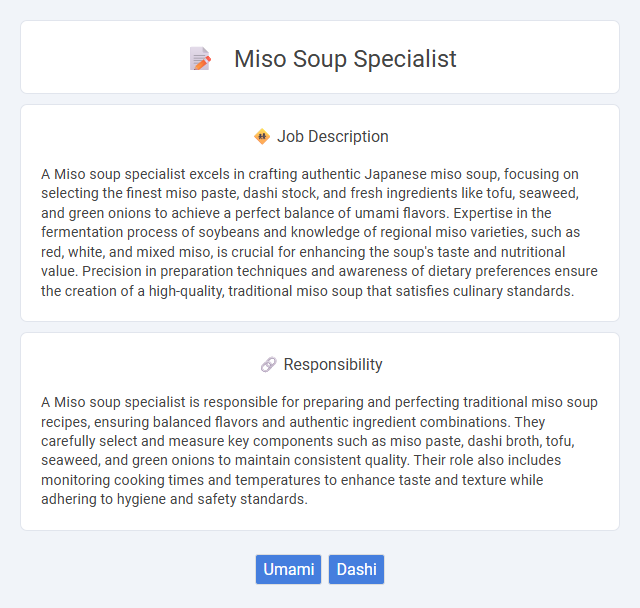
A Miso soup specialist excels in crafting authentic Japanese miso soup, focusing on selecting the finest miso paste, dashi stock, and fresh ingredients like tofu, seaweed, and green onions to achieve a perfect balance of umami flavors. Expertise in the fermentation process of soybeans and knowledge of regional miso varieties, such as red, white, and mixed miso, is crucial for enhancing the soup's taste and nutritional value. Precision in preparation techniques and awareness of dietary preferences ensure the creation of a high-quality, traditional miso soup that satisfies culinary standards.
Individuals who enjoy culinary arts and have a passion for Japanese cuisine are likely to find the role of a miso soup specialist suitable. Those with strong attention to detail and an ability to maintain consistency in flavor may have a higher probability of thriving in this position. Conversely, people who prefer less repetitive tasks or have difficulties working in fast-paced kitchen environments might find this job less compatible with their strengths.
Qualification
A Miso soup specialist must possess in-depth knowledge of traditional Japanese ingredients such as miso paste, dashi stock, and tofu to craft authentic flavors. Expertise in balancing umami profiles and maintaining proper soup consistency is essential for quality preparation. Culinary certification or extensive experience in Japanese cuisine enhances proficiency and credibility in this specialized role.
Responsibility
A Miso soup specialist is responsible for preparing and perfecting traditional miso soup recipes, ensuring balanced flavors and authentic ingredient combinations. They carefully select and measure key components such as miso paste, dashi broth, tofu, seaweed, and green onions to maintain consistent quality. Their role also includes monitoring cooking times and temperatures to enhance taste and texture while adhering to hygiene and safety standards.
Benefit
A Miso soup specialist may enhance restaurant quality by ensuring authentic flavor and consistent preparation, which could attract loyal customers. Their expertise might improve kitchen efficiency and reduce ingredient waste, leading to cost savings. Developing unique miso soup recipes may increase the establishment's competitive advantage and revenue potential.
Challenge
Working as a miso soup specialist likely presents challenges related to perfecting the balance of flavors and maintaining consistency across batches. The role may demand a deep understanding of various miso types and the ability to adapt recipes to different customer preferences. Precision and attention to detail are probably crucial to meet quality standards and satisfy discerning palates.
Career Advancement
Miso soup specialists develop expertise in traditional Japanese cuisine, mastering the preparation of various miso soup styles and ingredients like dashi, tofu, and seaweed. They can advance their careers by becoming culinary instructors, restaurant supervisors, or menu developers in Japanese or fusion restaurants. Specializing in miso soup also opens opportunities in food product development and international culinary consultancy.
Key Terms
Umami
A Miso soup specialist expertly balances fermentation processes and ingredient selection to maximize umami flavor, emphasizing high-quality miso paste and dashi stock rich in glutamates. Mastery of umami enhancement techniques, such as adding kombu and shiitake mushrooms, distinguishes their craft, creating a deep, savory taste experience. Precision in cooking time and temperature preserves the delicate umami compounds, ensuring consistent, authentic Miso soup quality.
Dashi
A Miso soup specialist expertly prepares dashi, the essential umami-rich broth foundational to authentic Japanese cuisine. Mastery in selecting and balancing ingredients like kombu, katsuobushi, and niboshi ensures a flavorful base that enhances the soup's depth and complexity. Precision in dashi preparation directly impacts the texture, aroma, and overall quality of the miso soup served.
 kuljobs.com
kuljobs.com